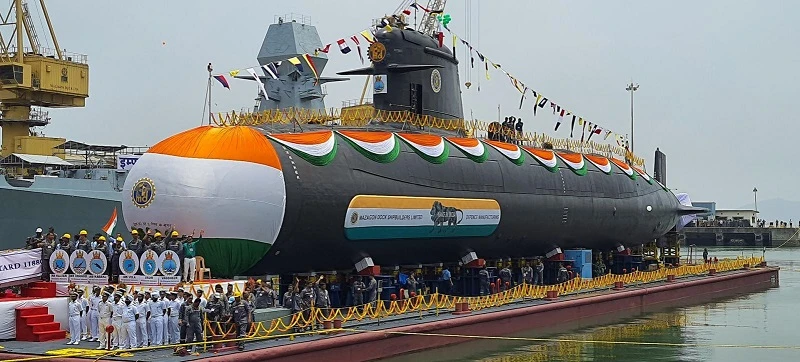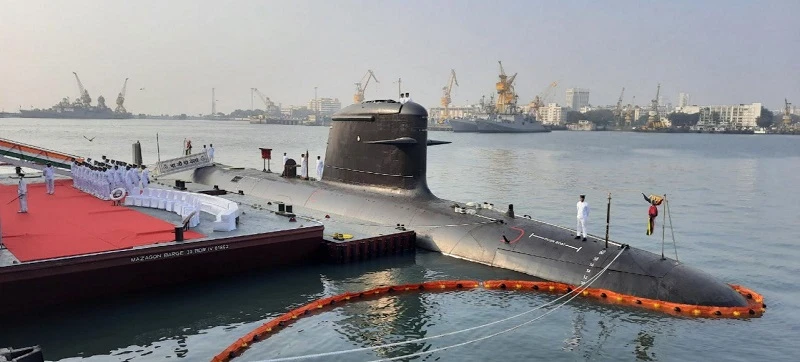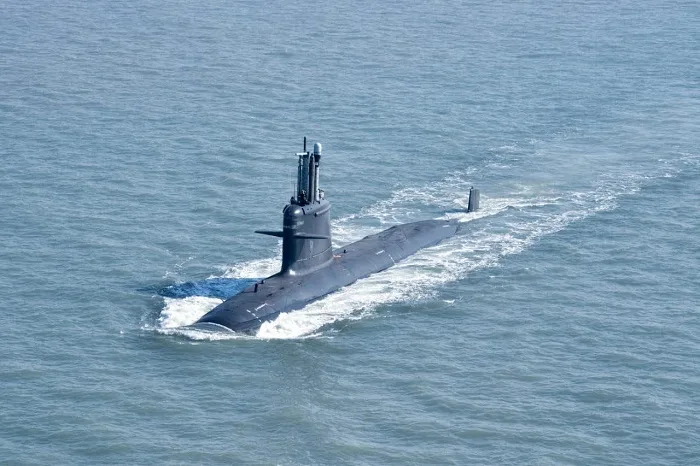The fifth Scorpene submarine of Project-75 named ‘Vagir’ was delivered to the Indian Navy on Tuesday as India continues to cement its position as a submarine-building nation, in tune with the spirit of ‘Atmanirbhar Bharat’ and Make In India.
Built indigenously at the Mazagon Dock Shipbuilders Limited (MDL) Mumbai, in collaboration with the Naval Group of France, the delivery of three submarines within a span of two years is a significant milestone in the growing prowess of the Indian defence industry.
The commissioning of the Vagir is part of an ongoing exercise to deter China, which is feverishly adding naval assets including aircraft carriers and nuclear submarines.
The first of the Project-75 submarines was commissioned into the Indian Navy in December 2017. As Vagir gets ready to be commissioned and enhance the Indian Navy’s capability along with the earlier four, the sixth and last submarine Vagsheer was launched on April 20 this year and would be delivered by late next year.
“We celebrate the success of ‘Make in India’ while moving towards a true sense of ‘Atmanirbhar’ naval defence industry,” Alain Guillou, EVP International Development at Naval Group said earlier this year.

India on its part is building its own naval arsenals which include Arihant class SSBNs-subs that can fire nuclear-tipped ballistic missiles. New Delhi is also building SSN submarines that are nuclear-powered but launch missiles with conventional warheads. Besides, India is building K-series Submarine Launched Ballistic Missiles (SLBMs) beginning with K-15 that has a range of 750 kilometers and K-4 that has a 5000-km reach.
Eventually, there is a plan to add Air Independent Propulsion (AIP) component in all the Kalvari class subs–a move that will allow these boats to roam freely underwater for long durations, reducing the time when they have to resurface for fueling.
The fifth submarine of Project 75, Yard 11879, Indian Navy’s Kalvari class – named Vagir after the sandfish that is a deadly deep sea predator of the Indian Ocean – was launched in November 2020 from the Kanhoji Angre Wet Basin of MDL and commenced its sea trials on February 1, 2022.
Back in 1973, a Vela-class diesel-electric submarine of the Indian Navy having the same name Vagir was commissioned into the Indian Navy. The Soviet sub was decommissioned on June 7, 2001 after almost three decades of yeoman service to the nation.
According to the defence ministry, the Scorpene Vagir enjoys superior stealth features (such as advanced acoustic absorption techniques, low radiated noise levels, hydro-dynamically optimised shape) and the ability to launch an attack on the enemy using precision-guided weapons.
“It is a matter of great pride that the submarine has completed all major trials including the weapon and sensor trials in the shortest time in comparison to the earlier submarines,” the Ministry of Defence said in a statement Tuesday.
The Scorpene is a 2000-tonne conventional submarine designed for all types of missions, such as anti-surface warfare, anti-submarine warfare, long-range strikes, special operations, intelligence gathering, mine laying, area surveillance, etc.
Extremely stealthy and fast, it has a level of operating automation that allows a limited number of crew, which reduces its operating costs significantly. Its combat edge is highlighted by the fact that it has 6 weapon launching tubes 18 weapons (torpedoes, missiles).
The attack can be launched with both torpedoes and tube launched anti-ship missiles, whilst underwater or on surface. The stealth of this potent platform is enhanced by the special attention provided to her characteristic underwater signatures.

The submarine is designed to operate in all theatres of operation, showcasing interoperability with other components of a Naval Task Force. It is a potent platform, marking a transformational shift in submarine operations.
At the commissioning of Indian Naval Ship (INS) Mormugao (D67) – the second warship of the P15B class of stealth guided-missile destroyers – at Naval Dockyard in Mumbai on Sunday, Defence Minister Rajnath Singh spoke about the Narendra Modi government’s initiatives towards making India an indigenous shipbuilding hub.
“Countries around the world are today moving towards modernising and strengthening their military power due to the global security scenario. The demand for military equipment is continuously increasing. We have introduced a number of policies which will help our public or private sector companies to become world class players,” said Singh.
“You all must take advantage of these policies and strive to cater to the needs of our Navy and Coast Guard, while meeting international requirements. We will extend all possible support to realise Prime Minister Narendra Modi’s vision of ‘Make in India, Make for the World’,” he added.
Also Read: US-France competition heats up for fighter jets to deck INS Vikrant




















